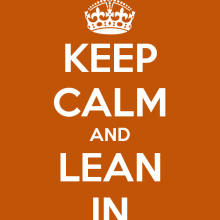Lean In
Then there’s the more recent pragmatic argument: you should want gender parity because of how it will help your own family, business, or city. In short, inequality and violence harms the women who are your partners and friends. Some suggest that it’s mighty convenient that men are ready to take a stand when we finally see how it benefits us. But one female friend advised me that men should ease up on themselves: “Just deliver gender parity, and we’ll gladly forget HOW exactly you got there. Deal?”
According to the Global Gender Gap Report released at the latest World Economic Forum, it will take 80 years to reach gender parity in pay, status, governance, etc. In the year 2095, my daughters would be approaching 100 years old, and my mother, wife, two sisters, aunts and so forth would be long dead along with me and all the women that I care about today. Why wait 80 more years? It’s time for all men to lean in and help cut that number in half (and then some).
I’ve joked before that having two older sisters is what every boy needs to make the world spin around more equitably. If not biological sisters, then let’s find older sisters for every boy. Hopefully with gender parity cut down to 20 years from 80, my 7-year-old son will need to work twice as hard to “get ahead,” since he’ll finally be competing fairly with the other half of the sky. May it be so.
There is a lot of conversation happening in the blogosphere around the movement by Sheryl Sandberg and friends to “Ban Bossy” Many women in leadership in faith circles can resonate with the sentiment of this campaign, as many faith-based institutions historically have silenced women by labeling leadership traits as “unfeminine” while simultaneously enshrining leadership as a male characteristic. Sandberg argued in her TED talk that inspired the movement, that in her experience many girls and women have been called “bossy” when boys and men who express similar sentiments are portrayed as “brave” and “leadership potential.” In my own experience I have experienced and seen this happen and have observed that few places are as guilty of this practice as faith-based institutions. As a professional woman and a mother of two precocious and intelligent girls, I was initially impressed with this effort to reshape the language of educators, mentors, and parents when encountering strong, opinionated children. However, upon further reflection, and after reading several engaging blogs across the political and ideological spectrum, I have changed my mind.
While I applaud Sandberg and associates efforts to highlight the gendered assumptions about leadership that are still present in many institutions and individuals in American society, I think their efforts to “ban” a word are misguided, as “banning” has the effect of stopping dialogue. What is really needed is a cultural conversation about the meaning of “leadership” and the rainbow of its expressions in society. We need an ongoing conversation about how leadership is perceived and how it is expressed in engendered and personality-based and culturally shaped ways. Their efforts to highlight the effects of a label like “bossy” are to be commended, but banning this label alone is not enough for building a future where women and girls have space at the table equal to men and boys, because there are men and boys and culturally different minorities who are also not at the table. It is time that we stop using gender as a straw man and begin considering how labels such as “bossy” construct such narrow definitions of leadership affect both developing boys and girls.
The year 2013 may well come to be known as the Year of the Woman.
Women of high socio-economic status both applauded and lamented the publication of Sheryl Sandberg’s Lean In, while women of a certain age waxed nostalgic over the 50th anniversary release of Betty Friedan’s The Feminine Mystique. Those under 30 were surprised that the latter book existed, and those in their middle years realized the reading assignment that somewhat bored them as inapplicable in college was now vitally important, as they struggled with work/life balance and debated whether to stay home with the kids or remain in the paid workforce.
The “mommy wars” raged, and were fueled by controversial statements and work policies by women in positions of leadership. Stay-at-home moms and paycheck-earning moms stared one another down across a divide narrower than they realized, and bloggers everywhere called for a united female front.
It is a lovely late afternoon in the little village of Bethany on a hilltop outside Jerusalem. This is a delightful place to visit because it offers a breeze above the valley. But Jesus stops here often for more than that. He knows he has friends in the persons of Martha and her siblings, Mary and Lazarus.
This day, as the family of Bethany looks down the road, they see Jesus and some of his disciples approaching. They know there will be time for conversation and food and rest before this group heads on into Jerusalem.
After a flurry of greetings, Martha is off to organize the meal. In a world without freezers or the possibility of takeout, unexpected guests can cause a bit of a stir.
WE OWE A lot to Anne-Marie Slaughter. Last summer, the Princeton University professor’s Atlantic article “Why Women Still Can’t Have It All” kicked off an overdue, protracted national-scale debate on the difficulty of juggling the demands of professional success and committed parenting, the likes of which we haven’t had in a while. Shortly after Slaughter’s polemic hit newsstands, Marissa Mayer, just 37, was named CEO of Yahoo!, becoming the youngest CEO of a Fortune 500 company at the time and stirring controversy when she revealed that she was seven months pregnant. (Months later, she banned telecommuting companywide and was sharply criticized by some as being “anti-parent.”)
Then, Facebook COO Sheryl Sandberg got in on the action, publishing in March the ambitiously titled Lean In: Women, Work, and the Will to Lead. In the following months, it sat at the top of bestseller lists, with staggering sales triggering multiple printings. Sandberg, one of the wealthiest women in the world, donates all related profits to her newly established nonprofit, also called Lean In, encouraging women to form consciousness-raising Lean In Circles, in which they’ll discuss money and maternity.
Suddenly, there was a lot of estrogen in the air. A year into this cultural conversation, we’re still trying to make sense of what it all means.
First, a caveat. I don’t know anyone, woman or man, naïve enough to believe that any of us can have whatever “it all” entails. When Slaughter’s indignant article set off a firestorm about the impossibility of work-life balance, I was happy (as I always am) to witness a (mostly) thoughtful discussion unfold. But I was and still am miffed that anyone thinks women were sold a false bill of goods. Who was that mightily influential yet terribly mysterious person who promised us everything we ever wanted? How did we let him (it must have been a “him”) get away with spreading such a vicious lie, and why do we allow it to persist?
Over the last several weeks, I’ve been trying to figure out exactly why I feel so bothered by Sheryl Sandberg’s book, Lean In.
I suggested to my husband that maybe I’m being defensive since I am an educated woman in a professional field who has very clearly chosen to “lean out” to spend more time at home.
Or maybe it’s because I disagree with putting any degree of blame for inequality in the workforce on women.
Or maybe it’s because I don’t like the idea of human capital.
None of those reasons, however, seem to explain why the book and the phrase “lean in” have become such an obsession for me. I certainly consider myself a huge proponent of equality and women’s rights. I have marched, protested, researched, worked toward, and fought for true equality for women all of my adult life.
So my discomfort with Sandberg’s book isn’t because I’m anti-woman or anti-feminist. It isn’t because I disagree with her and want all moms to stay home and bake cookies and volunteer for PTA. It isn’t even because I feel the need to defend my choice to be a 99-percent stay-at-home mom. Instead, it’s because, as a Christian, I believe that the whole idea of “leaning in” does not take into account the principle of putting others before self. (Phil. 2:3-8). This principle applies equally to both women and men.
(Caveat: neither women nor men should be trapped into subservience by children and/or spouse. I am talking about putting the real, rational, and loving needs presented by being part of a family before one’s individual needs.)
Well, somebody had to do it: Somebody had to go buy the incessantly hyped volume Lean In by the stratospherically successful Facebook COO (and mother of two) Sheryl Sandberg, and figure out what’s behind the seemingly endless radio talk shows and online profiles — they have been following me, they have, filling up my car like clouds of incense and dinging on my phone with the book’s mantra-like subtitle, Women, Work, and the Will to Lead.
I bought this part-memoir, part self-help book on a gorgeous spring weekday when, because I work part-time, I was supposed to be home anyway. Because the pollen was getting to me and I had woken up groggy, my husband generously offered to take the children to school on his way in to work, something that Sandberg would applaud: husbands who will assume major leadership at home are a major key in enabling mothers to succeed.
I stumbled around the house in my nightgown for a while, then finally got dressed and picked up Lean In at the Target in suburban Largo, Md., which at 10 on a weekday morning, was as silent as a tomb.
I drove half an hour to have lunch with a homeschooling friend, folded laundry and cleaned some grout, picked up my children from school and finally settled down to read the book on the bench at my son’s baseball practice, as the evening sun sank over the trees.
I found myself surprised by how much I enjoyed it: Sandberg, who’s about my age and who shares some of my generational preoccupations, comes across as warm and intimate, gently self-deprecating in describing her own “monkey bar” career path (it’s not a ladder, she says, because you can move sideways too), as well as some of her mistakes.





